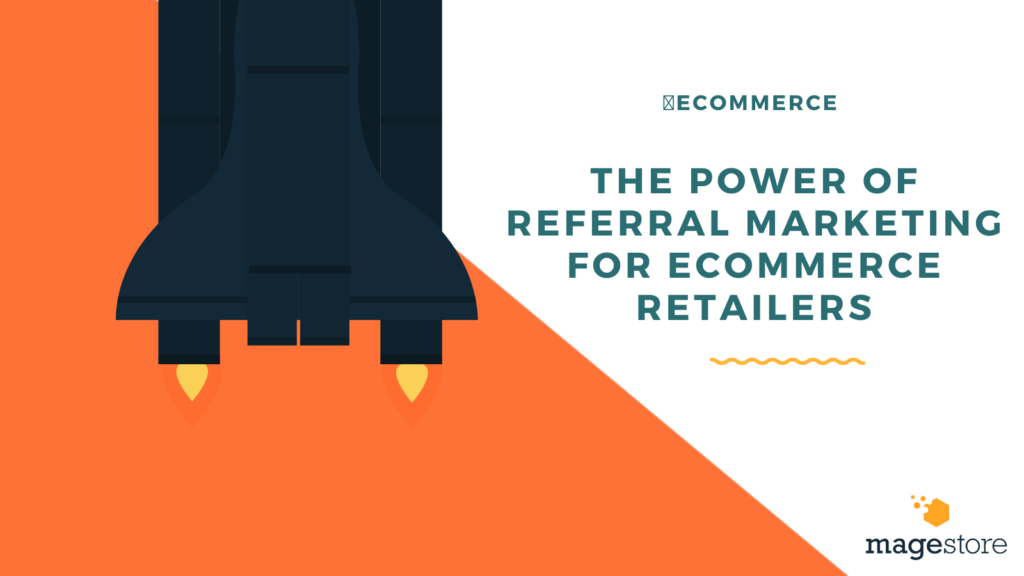Customer acquisition remains a challenge for eCommerce retailers. Advertising costs are increasing, and social networks are continually changing, making it time-consuming to acquire new customers. However, referral marketing offers an effective strategy. Referral programs can significantly boost growth for Magento stores by leveraging users’ trusted recommendations.
Why referral marketing matters for eCommerce
We tend to believe in people close to us. Research even indicates that word of mouth—for instance, friends’ and family’s recommendations—is considered trustworthy by 92% of consumers, a rate higher than any other form of advertisement. Most importantly, this trust is likely to be highly valued in online retailing, where customers cannot physically feel the textures of products before making a purchase.
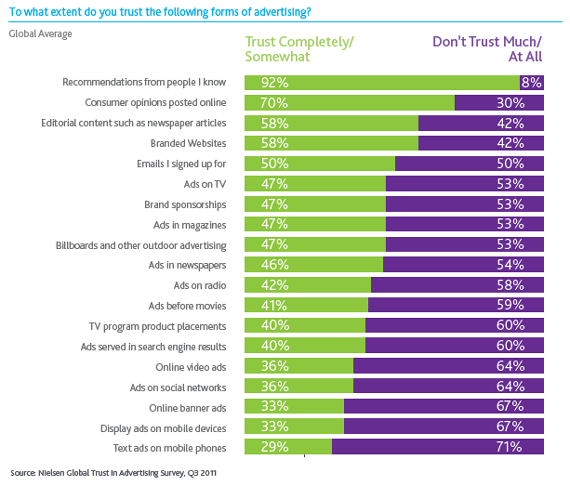
(Source: Statistics from Nielsen)
Referral marketing is a very useful tool based on trust between individuals. Word of mouth is always more potent than any other form of advertising, so turning your existing customers into salespeople is an extremely effective strategy. This trust factor is the underlying foundation of referral marketing, and eCommerce retailers have confidence in this technique’s demonstrated viability.
The impact of word of mouth has been statistically proven to drive eCommerce success, as these sample findings indicate:
- referred customers have a 37% higher conversion rate and a 16% higher lifetime value than customers from other sources.
- according to existing data, 84% of consumers have stated that they are more inclined to be pure advocates of a brand or to purchase a brand product that has been recommended by a friend.
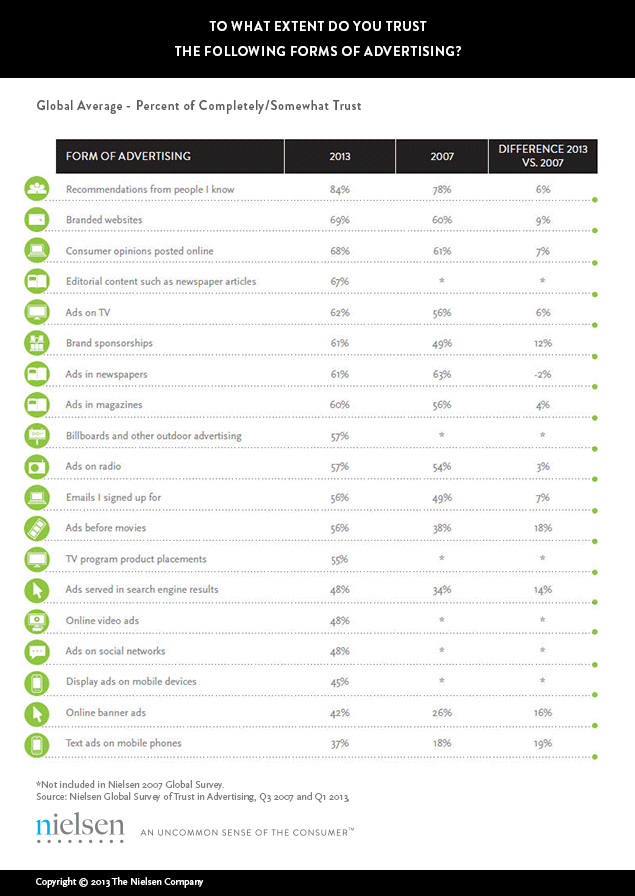
Referral marketing can help you leverage it to attract a new stream of customers while effortlessly converting appreciative customers into evangelists.
The benefits of referral marketing programs for Magento retailers
Customer acquisition & increased sales
The referral process can be considered one of the most effective ways to attract new customers. Satisfied customers will promote your Magento store within the frameworks of these programs using their personal social networks. This targeted approach reaches individuals who are more likely to trust your brand because it comes recommended by friends or family.
Here’s the magic: referred customers are 37% more likely to convert compared to those obtained through other marketing channels. Additionally, such clients are more valuable overall, with an average value 16% higher. Expanding this circle of referred customers will lead to more sales and better margins for your Magento business.
A good referral program should be able to create a self-perpetuating effect. The principle is simple: happy customers refer other people to the company, who then become happy customers themselves. This organic growth can continue, multiplying the impact and extending your company reach and customer base exponentially. This brings positive results to eCommerce retailers who embrace referral marketing.
Enhanced brand advocacy & customer loyalty
It’s not just about finding new customers or generating new business; a good referral program is about cultivating a community and building better relationships with existing customers. Indeed, when customers are rewarded for bringing friends to your store, they feel that they are a part of your brand. This feeling brings them closer and transforms them from simple customers into active marketers for the Magento store through word of mouth.
Referral programs are also one of the most effective methods for strengthening customer relationships. When a customer refers someone to a brand, they sincerely demonstrate their comfort and confidence in it. This recognition makes it possible for businesses to leverage their clients’ support and feedback, ensuring loyalty and encouraging repeat traffic.
In addition, the social buzz created by satisfied customers can positively affect a brand’s name. Word of mouth from friends and relatives is more effective than advertising, thus enhancing the brand’s image, attracting new clients, and helping retain existing ones.
Valuable customer insights & improved targeting
The benefits of referral programs do not end with revenue; they are a goldmine of customer information. By analyzing this information, businesses can identify customers’ habits, discover which programs are most frequently used in the purchasing process, and identify the company’s best referrers. Moreover, they can gather crucial demographic information about referred customers to better understand how new clients might be attracted even more effectively.
The implementation of the proposed model can acquire a significant amount of data for use in making strategic decisions for the following purposes:
- improving product offerings: Determine which products currently enjoy the most patronage from your referred customers so that you can adjust your innovations and advertising techniques.
- refining marketing campaigns: Ensure that the marketing campaigns and offers you use capture the social attributes of referred clients.
enhancing customer targeting: Marketing managers should be able to use data to determine the most profitable markets and those in which the greatest effort should be focused.

By compiling data from a referral program, you can draw accurate conclusions about the target audience and tailor any store on the Magento platform to meet its needs. This enhances customer satisfaction and loyalty, ultimately benefiting sales.
Building a successful referral marketing program for your Magento store
Defining your program goals & target audience
Although it’s certainly necessary to ensure that a referral program is properly integrated, it’s also vital to set objectives for the program and make it appealing to the targeted customer group. In implementing such strategies, the following perspectives should be considered:
- alignment with overall marketing strategy: The key point to emphasize is that your referral program shouldn’t exist in a silo. Instead, it should align with your overall marketing strategy. Are you aiming to target new customers, generate sales from existing customers, or simply raise brand awareness? Identifying these goals will guide the structure of your program and the design of incentives to encourage desired behaviors.
- targeting your audience: There’s more than one method to use with each strategy. When developing your program, consider the type of clients you want to engage. What motivates them? Are they only coming for low prices, or are they loyal to certain brands? Analyzing the target audience will enable you to determine the messaging and incentives that will obtain buy-in from targeted clients.
Below are some examples of what program goals could look like:
- acquire new customers: The emphasis here is on client acquisition and the proposal of competitive incentives for the referrer and referee.
- increase repeat purchases: By leveraging customers’ referrals, you can ensure that they come back and make more purchases.
- boost high-value products: Offer targeted rewards specifically for the product categories you aim to promote, offering special incentives to encourage word-of-mouth referrals for those items.
The next step is to ensure that the developed and implemented goals are clear and relevant to the intended audience, thus creating a strong foundation for the business’s referral marketing program.
Structuring your referral program & incentives
Of course, there’s quite a lot to say about the structuring of your specific referral system and the incentives to provide.
Referral programs can be set up according to several structures, each with its own benefits.
- one-way referral: In successful referral scenarios, a reward is most often given to the referrer only. While this option is relatively easy to implement and may not require any expenditure, it may also be necessary to provide incentives to referees.
- two-way referral: Here, the referrer also benefits from the referral and, hence, the profits attained within the referral period. Such an approach tends to increase interest and conversion indices.
- tiered referral: This type of program rewards customers with higher incentives in proportion to the number of customers they refer to the company. This structure can be very useful for rewarding high performers among referrers and increasing the scale of the program.
With any of these structures, it is important to note that attractive incentives must be offered. The type of reward given should entice both the referrer and the referee to take part in the program.
Below are some strategies regarding incentives for referral programs.
- discounts and coupons: Give a portion of a discount or other magnitude coupons to referrers and referees.
- free products or samples: It is recommended to offer free products, with a particular emphasis on referrals to high-value devices and appliances.
- flexible rewards: The program should be adaptable to accommodate different preferences; for example, some may prefer cash incentives in their accounts. However, offering new products or exclusive deals to both the referrer and referee can be more effective in certain cases. If time allows, conduct trials to determine which approach is the most effective for targeted customer groups. Such testing could involve offering different rewards, categorizing the targeted groups, or providing other appropriate stimuli.
- frictionless sharing: Businesses should offer customers an easy way to share product URLs. Furthermore, sharing a recommendation should be as easy as making one. This can be facilitated by social networking sharing buttons, pre-crafted referral messages, or images that allow easy clipping or delivery of a simple-to-employ link generator.
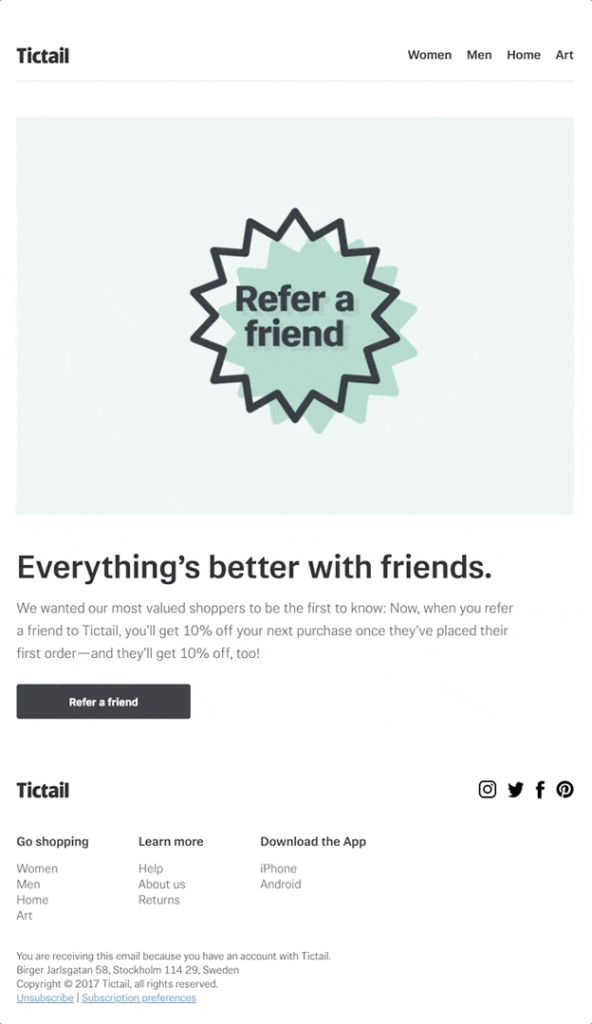
The “best” incentive is relative in this case, as it depends on the targeted audience and the objectives of the reward program. Offer a range of incentives and policies tailored to different customers, and keep them updated regarding which options suit them best.
Promoting your program & tracking results
Once you have designed your program, it becomes essential to let people know about it. Distribute your referral program via all available channels. One such channel is email marketing. Use it to promote your program and let your current customers know how it can help them. Be sure to provide referral links or codes and precise instructions on how anyone can participate.
Designing attractive and well-crafted emails is crucial for boosting engagement with referral programs. This is where email builders come into play. These web-based tools enable users to build thoroughly effective email templates without writing any code. They have features such as templates, drag-and-drop interface designs, and many other features that make your emails aesthetically appealing on all devices.
For example, Stripo is an effective tool for building email templates. In addition to a dynamic email content feature, it also provides a drag-and-drop editor and HTML editing. Trusted by more than a million users across several industry sectors, it allows users to design stunning and responsive templates without doing any coding. This allows you to focus more on crafting attractive email content without worrying about delivery logistics. With its powerful features and intuitive interface, Stripo is ideal for anyone aiming to run successful email campaigns.
Social media: This is the most effective way to spread the word to ensure that the general public learns about your program. To maximize its effectiveness, it is crucial to ask customers to share their referral experiences, thus encouraging the creation of user-generated content.
Website integration: To encourage participation throughout the Magento store, provide all the program details and links to referral sites in locations easily seen by customers.
Monitoring program implementation is vital for monitoring and evaluating the results achieved during the process. The following metrics should be tracked:
- program engagement: Record the total number of customers who enroll in the program.
- number of referrals: Determine the gross number of referrals made by the end of the observation period.
- conversion rates: Measure the ratio of actual client leads closed to the total number of clients referred to the business.
Various tools can help you track and analyze your referral program data. You can use built-in Magento analytics or integrate third-party referral marketing software to gain deeper insights.
Case Study: Snacking for a Cause and Cultivating Customer Loyalty—Love With Food’s Referral Recipe
Love With Food isn’t your average online snack shop. Imagine a subscription box overflowing with delicious, healthy treats delivered like a monthly surprise party to your doorstep. But here’s the twist—with each purchase, Love With Food donates a portion to fight childhood hunger. Pretty sweet, right?
So, how does Love With Food keep its snack-loving customers coming back for more while simultaneously expanding its reach and giving back to the community? Enter its ingenious referral program—a win-win-win for everyone involved.
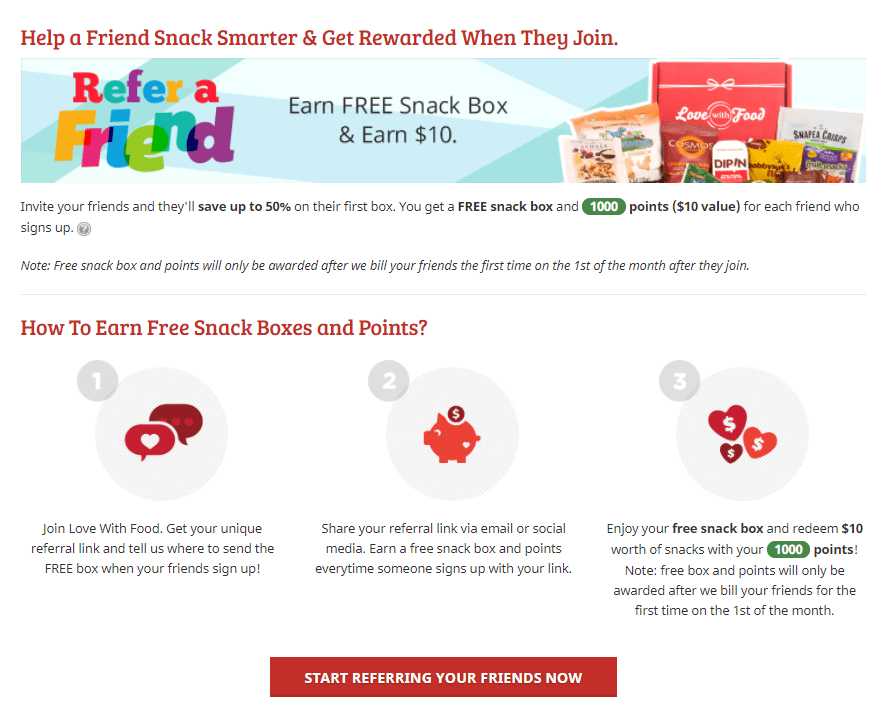
Sharing Is Caring—and Rewarding
Love With Food understands the power of word-of-mouth marketing. Their referral program is a master class in incentivizing existing customers to become brand ambassadors. Here’s how it works: refer a friend, and you’ll not only earn a free snack box but also rack up points redeemable for future purchases. It’s like getting paid for deliciousness!
Meanwhile, the newly referred friend gets a massive 50% discount on their first box. This sweet deal lowers the barrier to entry, encouraging referees to explore the world of Love With Food’s curated snacks.
Building a Community, One Snack at a Time
Love With Food’s referral program goes beyond just boosting sales. By offering tangible benefits to referrers and referees, it creates a sense of community and shared purpose. Existing customers can “fund” their future snack boxes through referrals, while new customers discover a delicious way to support a worthy cause.
This dual-benefit structure fosters loyalty and satisfaction, leading to a sustainable growth cycle. It’s a delicious recipe for success—happy customers, a thriving community, and countless bellies full of joy (and healthy snacks!).
A Referral Program for the Win
Love With Food’s story is a shining example of how referral marketing can be a powerful tool for eCommerce businesses. Their program not only drives customer acquisition but also strengthens brand loyalty and supports a social mission.
Conclusion
Referral marketing leverages the best marketing strategy, the personal recommendation, which is proven to be more effective than normal advertising methods in terms of customer acquisition and customer loyalty. A good referral program will not only increase a company’s sales but will also be the foundation of a community of brand believers who are willing to contribute to the success of the brand.
This article highlights several advantages of implementing a well-targeted and effective referral program. For instance, it can boost your store’s conversion and provide you with the detailed data necessary for business decision-making—but that’s just the tip of the iceberg, as it plays an intermediary role that is much more profound than issues of sheer quantity. Referral marketing is about spinning a more detailed story into your brand and investing in long-term relationships that are inspirational to customers. Whether your goal involves increasing sales, improving the level of customer relations, or enhancing the brand’s stability, the practical application of a tailored referral program is your key to success.
Author
Oleksii Burlakov
Oleksii Burlakov is a content writer at Stripo who is passionate about creating explicit and engaging content that simplifies complex email marketing concepts.


